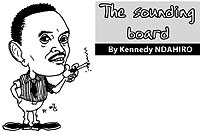THE eerie silence — from the opposition camps and their myriad of cheerleaders — following President Kagame’s landslide victory, was mysteriously deafening in the first week.


THE eerie silence — from the opposition camps and their myriad of cheerleaders — following President Kagame’s landslide victory, was mysteriously deafening in the first week.
As if trying to poke holes in the popular outcome of the polls, some have woken out of their stupor (triggered by a disappointing final chapter of the elections) and have turned to the familiar ground of recycling past incidents; whether isolated or not, to discredit the wishes of 89.6 % of all eligible voters in the country.
No, this is not a mathematical error. This figure represents the voices of 4,638,560 who voted for Kagame of the 5.178.492 registered voters. But since not all who registered exercised their rights (only 2.5% were absent and 68,625 ballots were declared invalid), Kagame nevertheless ran away with 93.08% of valid votes.
For the handful of interest groups out there who dare question the wishes of the majority, the message is one: The people of Rwanda have spoken. Who do you represent?
The chorus of ´lack of political space”, "stifling dissent” and "hounding independent media” has been gobbled up, lock, stock and barrel by many in the international community courtesy of a misinformed r intentionally malicious media who try and sell the idea that there is no democracy in Rwanda.
This not only portrays their ignorance and bias, but the sheer arrogance and patronising attitude in trying chart our destiny from the confines of their newsroom has its limits.
This country has refused to conform to the "normal” African country stereotype, where corruption, mismanagement, nepotism and violence; be it ethnic or religious or regional, is the order of the day.
This unconformity must be very annoying to the so-called experts who keep their bags packed, ready to catch the first plane out to come and prevent some barbarians tearing out each others’ throats.
Well, if they were thinking of coming here, they might as well unpack. This place is so boring for the video camera — even in times of elections — that it is better to leave it behind in the hotel room instead of hauling it around aimlessly.
In middle America, there is this group of weird people known as "storm chasers” who get a kick out of testing the limits of mother nature. Some are scientists studying the behaviour of tornados, but most are journalists and adventurers; the former looking for some spectacular shots while the latter crave for higher adrenalin levels by looking death in the face.
Members of the international media would have gone home disappointed after fruitlessly "storm chasing” the presidential elections in search of some drama, if it had not been for a violent incident Tuesday evening; a grenade attack in the city.
Within minutes of the incident, they were filing stories to their media houses in hysterical tones. The violence they had predicted that would accompany the elections had come at last! The country was on fire!
But just as they had ignored the outcomes of police investigations into the murders of a journalist and a hitherto unknown politician (according to them, a "leading opposition figure”), the fact that a key suspect in the grenade attack had been arrested was ignored completely.
The utter disregard of the capabilities of our law enforcement agencies has been the norm. They prefer sensational hearsay (In this case blaming the deaths of the journalist and politician on the government),
Instead of reporting that the killers of the journalist had confessed and that some suspects in the politician’s murder had been arrested and others on the run, they would rather keep the confusion hanging in the air.
If, for one second, we would blame the government for the recent deaths, what would it gain, especially in the run up to the elections and the international backlash that was bound follow? Who would stand to gain more if the government had its back on the wall?
It would be political suicide and the RPF government, I believe, has no intention of bidding farewell to the political arena any time soon, especially at a time when it enjoys unprecedented popular support.
Victoire Ingabire’s camp and its supporters must be the most disappointed of the outcome of the elections, and it’s time they went back to the drawing board. The Rwanda they expected to find and the ethnic sentiments they expected to arouse, have evolved into something they had never dreamed of; nationhood.
They should by now have gotten the message; when they called on the population to boycott the polls, they could have been testing the waters of their popularity. and the outcome was not very encouraging. Not only did the population ignore her call, but they sent a clear message: 97.5 turned up for the polls and nearly all of them voted for Kagame.
If no one understands this message and prefers to chase ghosts and tornados, that’s their cup of tea. But the people of Rwanda have decided, and they alone, not international pressure groups, sensation hunting media and a bevy of Genocide revisionists, know which glove fits them.
Ends


